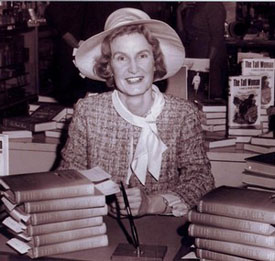
In 1955, seven years before the publication of Rachel Carson’s famed Silent Spring, another woman fought to issue her own groundbreaking analysis of environmental concerns.
Wilma Dykeman spent years studying the rivers of western North Carolina, but after she wrote her book The French Broad, her publishers tried to remove the chapters on pollution. However, Dykeman prevailed, and in addition to bringing river contamination to the nation’s attention, won the Thomas Wolfe Memorial Trophy, and inclusion in the Rivers of America series. The river itself became an important aspect of Dykeman’s work, as she focused much of her life and writing in the mountains of western North Carolina and east Tennessee.
“I’d always been aware of the great natural resources we have here, and I became very concerned about the water pollution. I mean, [The French Broad]…has been destroyed because of greed and selfishness and apathy on all our parts,” she once said.
The river communities thanked her by developing the Wilma Dykeman RiverWay, a seventeen-mile greenway between the French Broad and Swannanoa Rivers in Asheville, North Carolina. It marks Dykeman’s ahead-of-her-time contribution to the environment, as well as her equally progressive stances on gender and race relations.
She first tackled race issues with her husband, James Stokely, whom she wed in 1940, after the two graduated from Northwestern University. Their book, Neither Black Nor White (1957), portrayed their personal reflections on the 1954 Brown vs. Board of Education Supreme Court Case. After its publication, the duo won the Hillman Award for contributions to world peace, civil liberties, and race relations.
Dykeman embraced her newfound motivational powers. “What has always stirred action?” she once wrote. “What has usually stirred societies, historically, to action? We had any number of reports about slavery, but it was Uncle Tom’s Cabin that lit the fuse… A novel, there, really galvanized the whole action. What is it that we have from societies today that we remember, that we know about societies of the past, their conflicts? It’s the literature… It is absolutely essential that we each respect each other.”
Dykeman and Stokely collaborated on several other projects, and as Appalachian writer Jeff Daniel Marion claimed, they were partners in “every sense of the word… partners in writing, partners in marriage and partners in having similar points of view,” until Stokely died in 1977. Dykeman never remarried, though she lived another thirty years.
In addition her position on race relations, Dykeman always felt that “the Appalachian woman has had a rather difficult time being understood,” and in order to rectify the image, wrote her first work of fiction, The Tall Woman, in 1962. The heroine of the novel, Lydia McQueen, fights to build a school for Appalachian children, which also projects Dykeman’s firm beliefs on the value of education.
“It seemed to me that another way to communicate some of these things was through a novel, that people could be involved in the people’s lives in a novel in a way they were not in the nonfiction books,” she explained.
Dykeman wrote a follow-up, The Far Family, published in 1966, which continued to focus on the role of an Appalachian family from the Civil War to the twentieth century. To further promote social change, Dykeman completed a project on Edna Rankin McKinnon, a pioneer in family planning.
“I think you see literature often shows us more about a society…than other disciplines can because they can bring in the nuances of life, they can bring in all of the religious and personal and individual overtones that an economic report still cannot bring in…often the nuances, the richness, could not come out any way except in some of these books and novels that I’ve been mentioning. And in the world’s literature—that’s where we’ve learned about societies; that’s where we’ve learned about the way people really live, bring in their values, bring in all of these other aspects that are so important.”
To furnish that belief, she spent the next twenty years in Knoxville, Tennessee, teaching courses in Appalachian literature at the University of Tennessee. In addition to requiring her students to read works by Nikki Giovanni and Thomas Wolfe, she included her own books.
“Your own experience in writing is what, I presume, that they like for you to draw on in teaching writing. I mean, that’s the only way that any of us can really share.”
In addition to her books and teaching, Dykeman wrote short stories and radio scripts, as well as magazine pieces. Her work has appeared in the New York Times Magazine and Harper’s, as well as other periodicals, with her most-well known work being the long-running column, “The Simple Life,” which ran in the Knoxville News Sentinel from 1962 until 2000.
To thank Dykeman for her years of work, the Tennessee legislature named her State Historian in 1981. Her passion for state history also led her to push for a Tennessee encyclopedia, which celebrated the state’s bicentennial.
In addition to her other honors, Dykeman received a Guggenheim Fellowship, and sat on several regional boards dealing with conservation, literature, history and women’s issues. She also became a noted public speaker, presenting up to seventy-five speeches a year.
After more than fifty years of writing and motivating the public, Dykeman passed away on December 23, 2006, from complications after a hip surgery. She is buried in Asheville, North Carolina, near the river she helped save.
Selected Bibliography
The French Broad (nonfiction), 1955
Neither Black Nor White (nonfiction), 1957
The Tall Woman (fiction), 1962
The Far Family (fiction), 1966
Look to This Day (memoir), 1968
Return the Innocent Earth (fiction), 1973
Tennessee: A Bicentennial History (nonfiction), 1975
Selected Links
Wilma Dykeman’s obituary in The New York Times:
http://www.nytimes.com/2006/12/29/books/28dykeman.html?_r=1
An interview with Dykeman in the journal of The Society for the Study of the Multi-Ethnic Literature of the United States (first page only; full text requires JSTOR account/access):
http://www.jstor.org/pss/467284





